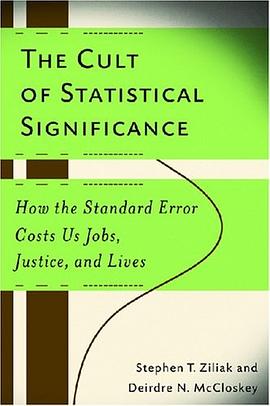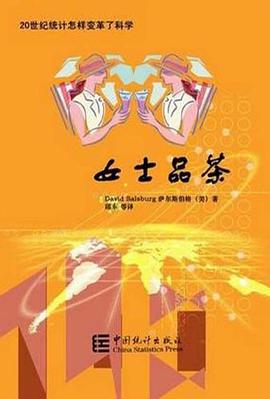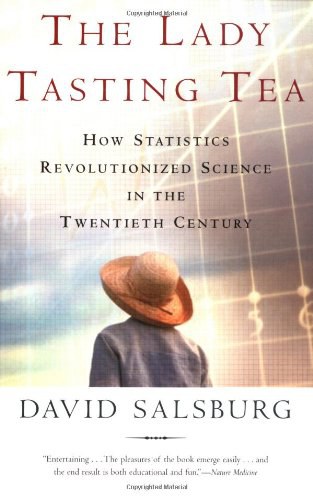statistics
The Cult of Statistical Significance 豆瓣 Goodreads
作者:
Stephen Thomas Ziliak
/
Deirdre N. McCloskey
University of Michigan Press
2008
- 4
"McCloskey and Ziliak have been pushing this very elementary, very correct, very important argument through several articles over several years and for reasons I cannot fathom it is still resisted. If it takes a book to get it across, I hope this book will do it. It ought to."--Thomas Schelling, Distinguished University Professor, School of Public Policy, University of Maryland, and 2005 Nobel Prize Laureate in Economics "With humor, insight, piercing logic and a nod to history, Ziliak and McCloskey show how economists--and other scientists--suffer from a mass delusion about statistical analysis. The quest for statistical significance that pervades science today is a deeply flawed substitute for thoughtful analysis. . . . Yet few participants in the scientific bureaucracy have been willing to admit what Ziliak and McCloskey make clear: the emperor has no clothes."--Kenneth Rothman, Professor of Epidemiology, Boston University School of Health "The Cult of Statistical Significance" shows, field by field, how "statistical significance," a technique that dominates many sciences, has been a huge mistake. The authors find that researchers in a broad spectrum of fields, from agronomy to zoology, employ "testing" that doesn't test and "estimating" that doesn't estimate. The facts will startle the outside reader: how could a group of brilliant scientists wander so far from scientific magnitudes? This study will encourage scientists who want to know how to get the statistical sciences back on track and fulfill their quantitative promise. The book shows for the first time how wide the disaster is, and how bad for science, and it traces the problem to its historical, sociological, and philosophical roots. Stephen T. Ziliak is the author or editor of many articles and two books. He currently lives in Chicago, where he is Professor of Economics at Roosevelt University. Deirdre N. McCloskey, Distinguished Professor of Economics, History, English, and Communication at the University of Illinois at Chicago, is the author of twenty books and three hundred scholarly articles. She has held Guggenheim and National Humanities Fellowships. She is best known for "How to Be Human* Though an Economist "(University of Michigan Press, 2000) and her most recent book, "The Bourgeois Virtues: Ethics for an Age of Commerce "(2006).
Statistical Significance 豆瓣
作者:
Siu. L Chow
Sage Publications Ltd
1997
- 2
The Lady Tasting Tea 豆瓣
作者:
David Salsburg
Non Basic Stock Line
2002
- 5
At a summer tea party in Cambridge, England, a lady states that tea poured into milk tastes differently than that of milk poured into tea. Her notion is shouted down by the scientific minds of the group. But one guest, by the name Ronald Aylmer Fisher, proposes to scientifically test the lady's hypothesis. There was no better person to conduct such a test. For Fisher had brought to the field of statistics an emphasis on controlling the methods for obtaining data and the importance of interpretation. He knew that how the data was gathered and applied was as important as the data themselves.
In The Lady Tasting Tea, readers will encounter not only Ronald Fisher's theories (and their repercussions), but the ideas of dozens of men and women whose revolutionary work affects our everyday lives. Writing with verve and wit, author David Salsburg traces the rise and fall of Karl Pearson's theories, explores W. Edwards Deming's statistical methods of quality control (which rebuilt postwar Japan's economy), and relates the story of Stella Cunliff's early work on the capacity of small beer casks at the Guinness brewing factory.
The Lady Tasting Tea is not a book of dry facts and figures, but the history of great individuals who dared to look at the world in a new way.
In The Lady Tasting Tea, readers will encounter not only Ronald Fisher's theories (and their repercussions), but the ideas of dozens of men and women whose revolutionary work affects our everyday lives. Writing with verve and wit, author David Salsburg traces the rise and fall of Karl Pearson's theories, explores W. Edwards Deming's statistical methods of quality control (which rebuilt postwar Japan's economy), and relates the story of Stella Cunliff's early work on the capacity of small beer casks at the Guinness brewing factory.
The Lady Tasting Tea is not a book of dry facts and figures, but the history of great individuals who dared to look at the world in a new way.




